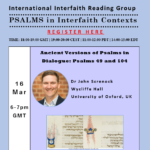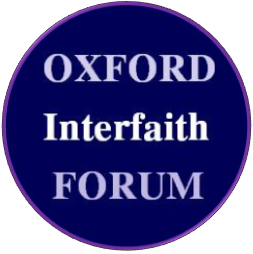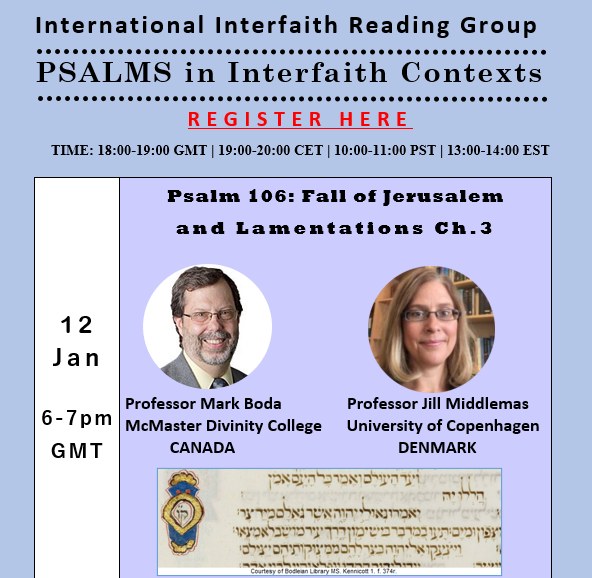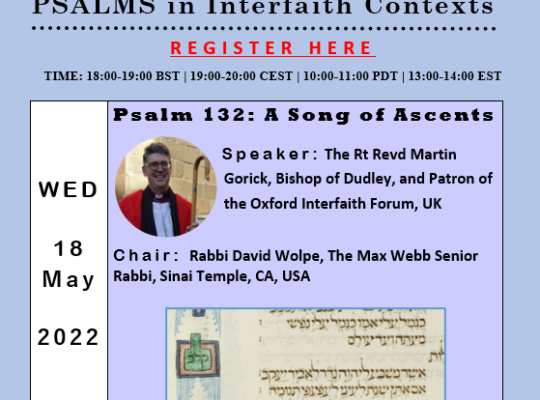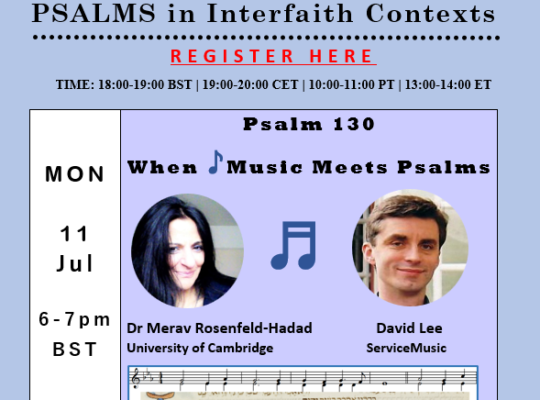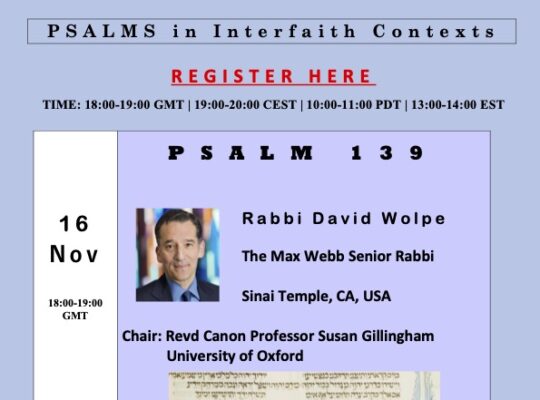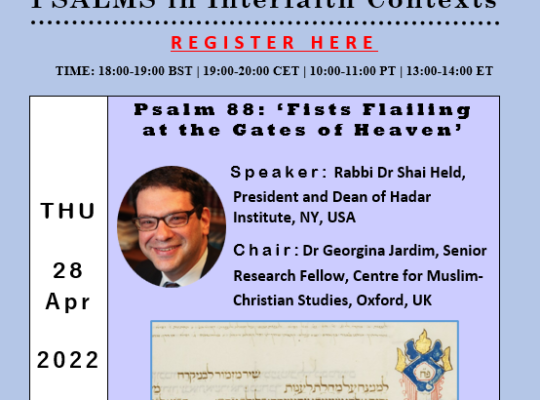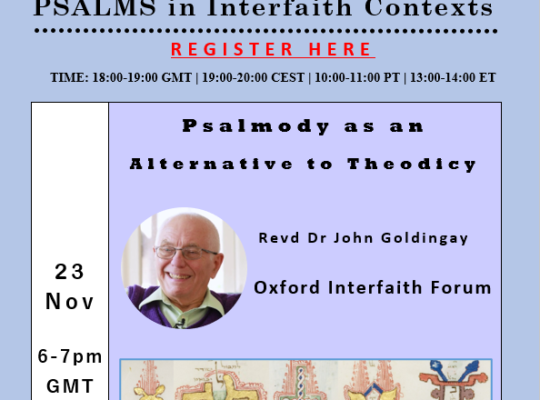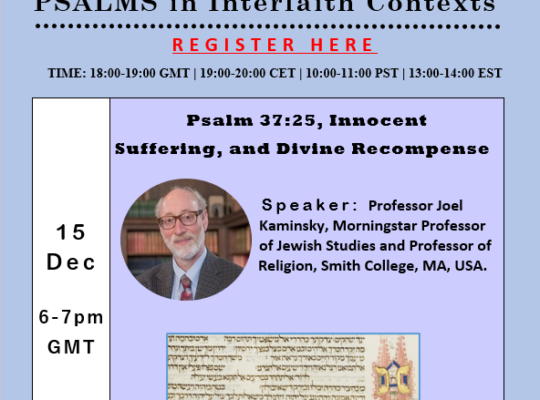12 January 2023
We are deeply honoured to welcome Professor Mark Boda, McMaster Divinity College, Canada, and Professor Jill Middlemas, University of Copenhagen, Denmark, to lead a session of the Psalms in Interfaith Contexts Reading Group.
Here are the details of this fascinating session.
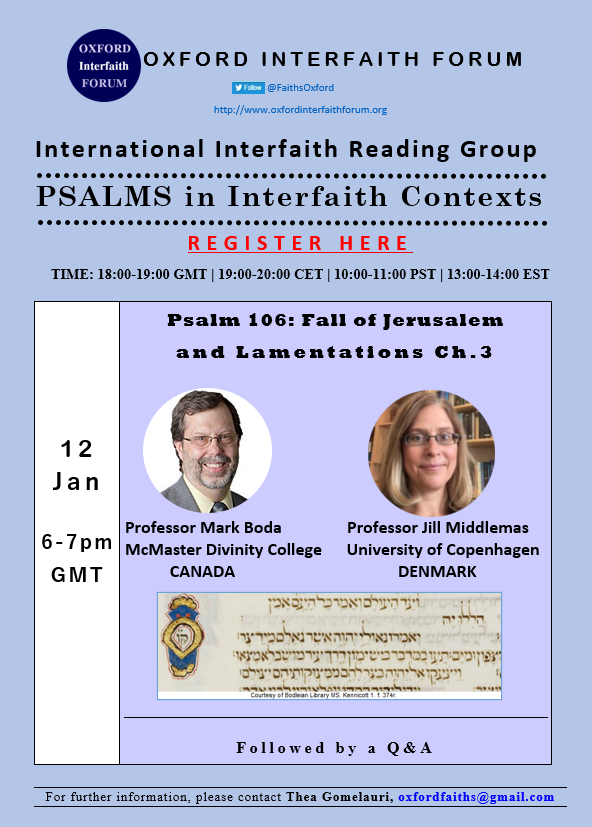
Topic: Psalm 106: Fall of Jerusalem and Lamentations Ch.3
Abstract: Psalm 106 introduces an important type of prayer that developed around the time of the catastrophic fall of Jerusalem. We will illustrate the elements of the genre of penitential prayer in the Hebrew Bible by using Psalm 106 with particular focus on confessions of sin (v. 6), history of disobedience (passim), justification of God (passim), request (vv. 4, 47), against the backdrop of lament (v. 44, 47). We will provide an overview to other similar types of prayer in the Hebrew Bible and show the alignment of Lamentations ch. 3 (especially vv. 40-47). By way of contrast, then, the talk will also examine the motivating traditions behind certain the exilic/ post-exilic expressions of Penitential Prayer outside the Psalms.
Speaker: Professor Mark J. Boda, Professor of Old Testament at the McMaster Divinity College, Canada. Mark joined the College in 2003 after teaching for nine years at what is now Ambrose University / Seminary in Calgary (formerly Canadian Bible College/Canadian Theological Seminary). Professor Boda received his DPhil from the University of Cambridge University. He has authored 12 books, edited 19 volumes of collected essays, and written over 100 articles on various topics related to the Old Testament and Christian Theology. He serves on the Committee on Bible Translation, responsible for the New International Version and is a past president of the Canadian Society of Biblical Studies and program secretary of the Institute for Biblical Research. Key areas of interest include Old Testament Theology, prayer and penitence in Old Testament and Christian Theology, Babylonian and Persian Period Hebrew Books and History (Jeremiah, Lamentations, Chronicles, Ezra, Nehemiah, Haggai, Zechariah, Malachi), the Book of the Twelve (Minor Prophets), Isaiah, Judges, and Psalms.
Speaker: Professor Jill Middlemas, Theology Faculty at the University of Copenhagen, Denmark.
She has two Masters and a DPhil from Oxford University, were she conducted research at the Oxford Centre for Hebrew and Jewish Studies as well as the Faculties of Oriental Studies and Theology, where she also taught until 2007. She held a Levehulme grant during this time at the Oriental Institute. Her doctoral thesis published in the Oxford Theological Monograph series as The Troubles of Templeless Judah (2005) led to further research and publications on the history, literature, anthropology, and theologies of the homeland, Babylonian exile, and diaspora. In more recent years, she has focused on aniconism, the imago Dei, and metaphorical language for God. With respect to biblical interpretation, she published an introduction to the book of Lamentations last year (2021) and has a commentary in press on the Book of Esther and the Additions in the Wisdom Commentary series. Both place scholarly work in conversation with (post)modern questions related to gender, minority, and postcolonial issues, among others. In 2019 she wrote a chapter on Dating Esther: Evaluating the Criteria for a Persian or Hellenistic Provenance in On Dating Biblical Texts to the Persian Period. She is currently writing a book to present approaches and uses of the Old Testament in Judaism, Christianity, and Islam entitled, Whose Bible are you reading? Re-written Scripture and the Old Testament in the Abrahamic Religions.
Time: 18:00-19:00 GMT I 20:00-21:00 Israel Time | 10:00-11:00 PST | 13:00-14:00 EST
Venue: Online
After registering, you will receive email from ZOOM containing information about joining the meeting. If you do not see a Zoom email in your inbox, please, check your spam folder.
If you would like to join the Psalms in Interfaith Contexts Reading Group, please sign up here.
Related Sessions
- Psalmody as an Alternative to Theodicy
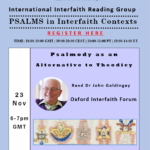
- Beyond Exegesis: The Psalm Cultures of Ancient Jews and Early Christians
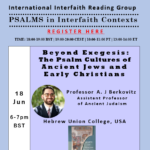
- Psalm 40 and Messiness of Prayer
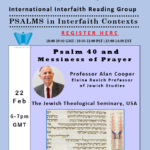
- Psalm 109: The Prayer No One Wants
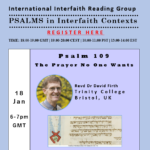
- A Book for All Seasons: Medieval Liturgical Psalter
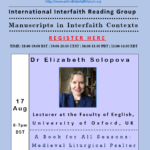
- Exile and Restoration in the Psalms
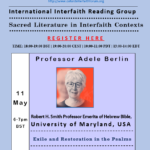
- Psalm 37:25, Innocent Suffering, and Divine Recompense
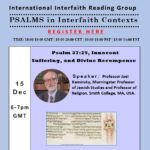
- Psalm 44 and the Book of Job: God on Trial
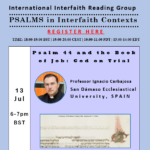
- Psalm 132: A Song of Ascents
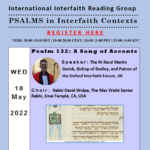
- Psalm 88: ‘Fists Flailing at the Gates of Heaven’
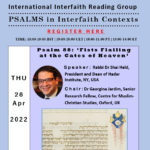
- Psalm 82: Demanding Justice
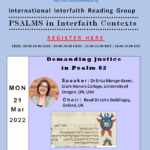
- Surprising Uplift of Psalm 23
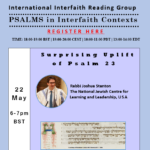
- ‘Deep cries unto deep’: Julian of Norwich and Psalm 42
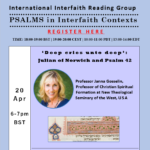
- Psalm 51: Contemporary Multifaith Interpretations
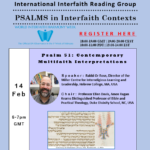
- Comparative Reading of Psalms and Abrahams’ Prayers in the Quran
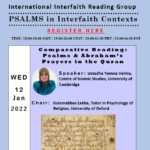
- Psalm 33: Mystical Reading
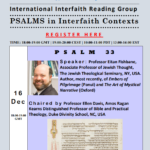
- Psalm 139
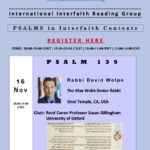
- Psalm 1: Inaugural Session by Revd Dr John Goldingay
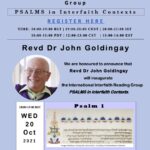
- Psalm 131: How I Weaned Myself from the Breast of God
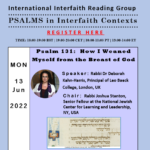
- When Music Meets Psalms: Psalm 130
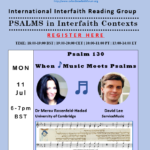
- Psalm 46: Singing in Hope and Defiance
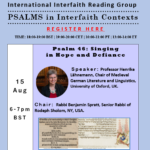
- Psalm 19: Muslim Reflections on Creation
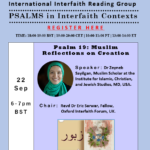
- Psalm 106: Fall of Jerusalem and Lamentations Ch.3
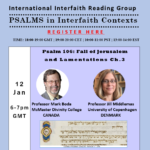
- Midrash Tehillim on Psalm 24
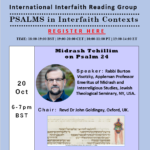
- Spurring Colonialism and Slavery: Protestants and Catholics United in their Use of Psalm 132
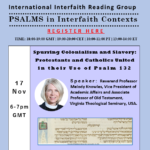
- Awake, My Soul! Psalms: 44; 57; 133; 143
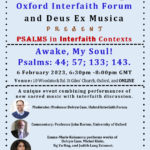
- The Art of Sacred Sound in the Muslim Context: Psalms and Islam
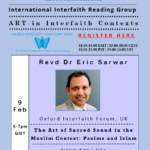
- Music, Poetry, and Psalm 131 in Christian Liturgy
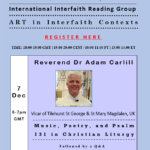
- Ancient Versions of Psalms in Dialogue: Psalms 49 and 104
